Publications
 We author and publish a range of resources to keep you up to date with the latest developments in employment, labour market and human resource policy and practice.
We author and publish a range of resources to keep you up to date with the latest developments in employment, labour market and human resource policy and practice.
All our pdf publications are free to access.
-

From consultation to co-production: high-involvement change
IES Perspectives on HR 2016
Garrow V | Apr 2016 | Institute for Employment StudiesHigh-involvement work practices have featured in management research and literature for decades but when it comes to organisational change, people still tend to feel 'done to'. This might be because change is often happening in crisis mode when things need to happen quickly and control is centralised. There is usually some form of consultation but little real involvement in the design and development of structures and processes that will impact people's working lives.
-

Swimming against the tide: getting whistleblowers on board
IES Perspectives on HR 2016
Reilly P | Apr 2016 | Institute for Employment StudiesPeter Reilly highlights the practical, procedural difficulties of whistleblowing for HR, but ends with the deeper, worrying evidence that half of HR leaders are being forced to compromise on their principles and the stark challenge that ‘HR might like to start with acknowledging it has a moral purpose in the organisation and make that the basis for its contribution to difficult business decisions.’
-

Performance management, a tale of two practices?
IES Perspectives on HR 2016
Tamkin P | Apr 2016 | Institute for Employment StudiesOf all HR practices, performance management systems appear to be almost universally embedded in organisational best practice. One CIPD survey found that 95 per cent of organisations have appraisals (Sung and Ashton, 2005). Assuming that organisations behave rationally, we might expect that they use appraisals because they benefit the organisation.
-
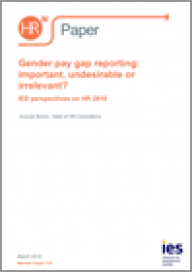
Gender pay gap reporting: important, undesirable or irrelevant?
IES perspectives on HR 2016
Brown D | Apr 2016 | Institute for Employment StudiesDuncan Brown offers a detailed description of this year's gender pay reporting requirement and how to maximise the benefits from it.
-
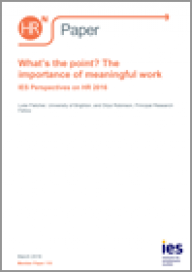
What's the point? The importance of meaningful work
IES Perspectives on HR 2016
Fletcher L, Robinson D | Apr 2016 | Institute for Employment StudiesWe spend a lot of our time at work. Around eight hours a day, for at least 40 weeks every year, for 40 years or so.
-
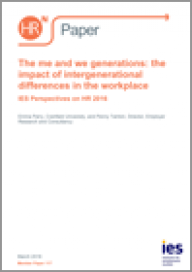
The me and we generations: the impact of intergenerational differences in the workplace
IES Perspectives on HR 2016
Parry E, Tamkin P | Apr 2016 | Institute for Employment StudiesGenerational differences and how they play out in the workplace have become a major area of interest to organisations and catalysed articles in the HR and broader business press and much commentary from consultancy organisations. The thrust of many of these articles is that such generational differences are fuelling difficulties in the workplace as different attitudes clash.
-
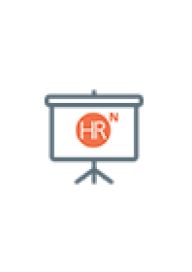
Slides: Performance management: making it work
Peter Reilly | Mar 2016 | Institute for Employment StudiesPeter Reilly's presentation slides from IES HR Network event 'Performance management, change at last?', 22 March 2016
-

Slides: Performance management, change at last?
Peter Reilly | Mar 2016 | Institute for Employment StudiesPeter Reilly's presentation slides from IES HR Network event 'Performance management, change at last?', 22 March 2016.
-

ORGANISER: A behavioural approach for influencing organisations - Summary
Fell D, Giorgi S | Mar 2016 | Cabinet OfficeThis document is a summary of ORGANISER: a behavioural approach to influencing organisations. It was commissioned by a cross-Government group and has been designed to support better policy making.
-
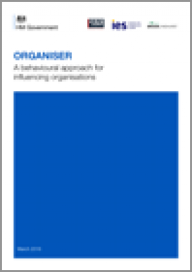
ORGANISER: A behavioural approach for influencing organisations
Fell D, Giorgi S | Mar 2016 | Cabinet OfficeORGANISER is a behavioural approach to influencing organisations. It was commissioned by a cross-Government group and has been designed to support better policy making.
